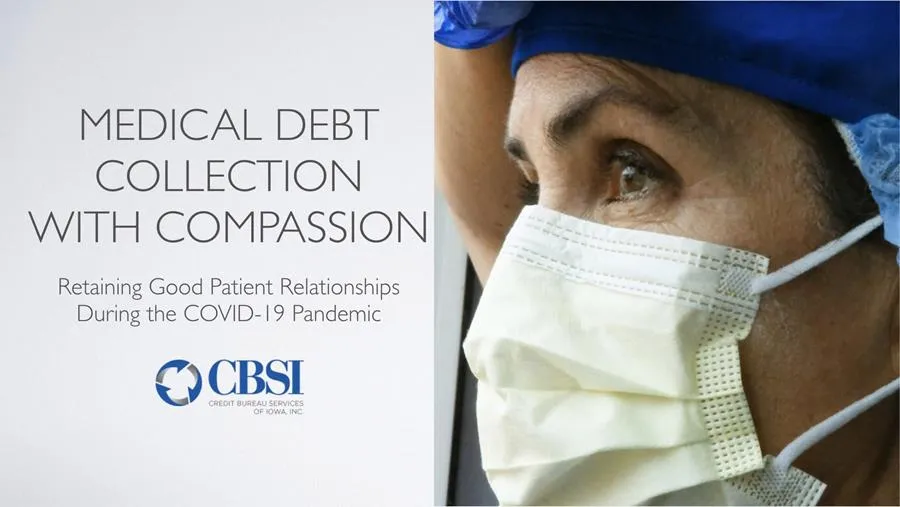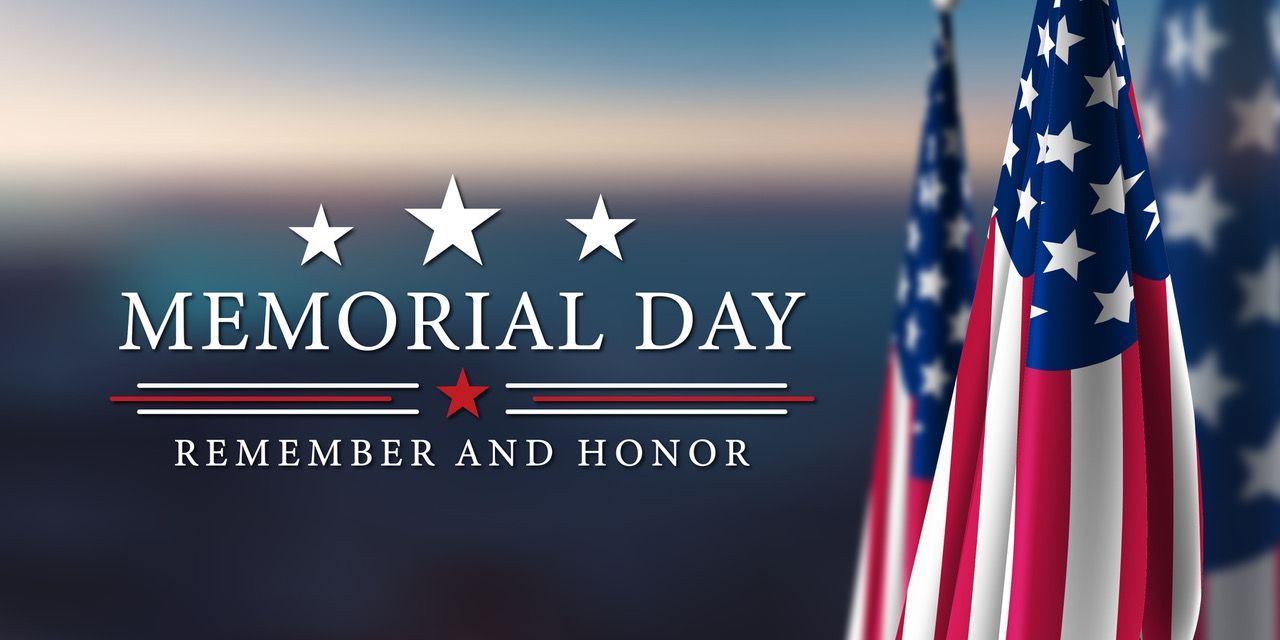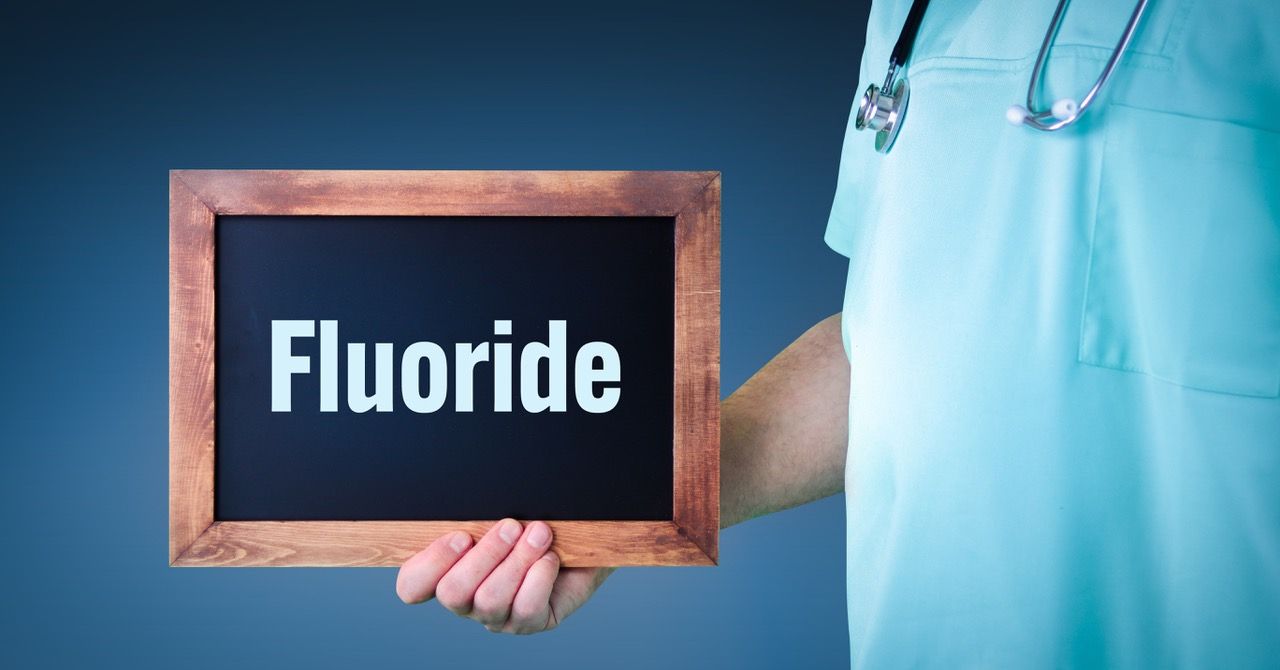Medical Debt Collection with Compassion

Retaining Good Patient Relationships
During the COVID-19 Pandemic
Imagine a collection agency recovering your accounts receivable and maintaining a happy customer, all while delivering great customer service and ensuring regulatory compliance! In this 30-minute webinar, you'll learn how they do it. You'll also be updated on best practices for accounts receivable during the coronavirus pandemic.
Tom Barrett:
Good morning, everyone. Welcome to our webinar, Medical Debt Collection with Compassion: Retaining Good Patient Relationships During the COVID-19 Pandemic. My name is Tom Barrett and I've been working with CBSI for the past four years on marketing communications. They got started in 1955. They've provided collection services for governments, schools, attorneys, healthcare, utilities, consumer and commercial clients. Their collectors are more than just sympathetic, they're empathetic. And most of them know what it's like to have an unpaid debt going to collections, because they've been on that side of the fence. They treat your customers the way they want to be treated. CBSI's respectful, solution-focused interactions with consumers produce better results than harsh demands, and that's more important today during the pandemic than ever before. Their collectors are trained to ask questions, analyze the facts and help identify a solution that meets both your and your consumer's needs. With their friendly approach, their caring approach, everybody wins.
With me today is Amy Vroegh. Amy has been with CBSI since for the last 13 and a half years. She is their collections manager and she's going to walk us through today what we are experiencing with the pandemic and debt collections. Amy?
Amy Vroegh:
Good morning.
Tom Barrett:
Amy, tell us what you've been experiencing with debt collections over the last eight weeks or so, since the pandemic first started.
Amy Vroegh:
Our contact rate has been very high. People are answering the phones. They have more time on their hands. They're at home. And this pandemic has given us an opportunity to have a conversation. People want to talk right now. They have a lot on their minds. They're looking at their credit report. They're looking at refinancing their home, purchasing new vehicles, and just clearing up their old debt. So they have been answering the phone.
Tom Barrett:
And as I understand it, you're experiencing a pretty high collection rate. Not only are they answering the phones, but they want to pay.
Amy Vroegh:
Yes, people are wanting to clear up the items that are on their credit report, or even accounts that may not be on their credit report. But they're wanting to clear up the bad debt that they have.
Tom Barrett:
And you are having people call you even about old debts that are beyond the legal statute of limitations, if I understand it correctly.
Amy Vroegh:
Yes, very much so. People are reaching out to us because, like I said, they have time on their hands and maybe they found an old letter from us or, you know, they remember having a conversation. They are calling to see if they can resolve the issue.
Tom Barrett:
And as I understand it, the conversation has actually gotten started because of the pandemic.
Amy Vroegh:
Yes, people want to talk about it, they want to know your thoughts, opinions, ideas, you know, how things are going. And we want to listen to them. That's our goal.
Tom Barrett:
Would you go through a collection call with me? Just for our audience, go through what a typical collection call would sound like and how it would be handled.
Amy Vroegh:
Sure.
Tom Barrett:
So go ahead. I'll be the debtor. You'll be the collector.
Amy Vroegh:
All right. Hi, is Tom Barrett there?
Tom Barrett:
This is him.
Amy Vroegh:
Hi, Tom. This is Amy calling from the Credit Bureau Services of Iowa. Can you verify the last four of your social or date of birth for me please so I can make sure I'm speaking to the right Tom?
Tom Barrett:
Yeah, it's four five two five.
Amy Vroegh:
All right, Tom? Yep, I do show that's the same person. I do need to tell you, Tom, since this is the first time we've spoken, we are the Credit Bureau Services of Iowa. So this is an attempt to collect a debt and any information obtained will be used for that purpose. Tom, I'm calling you today about an account that was turned over to us from ABC Hospital. It looks like it has a balance of $685. Looks like a date service of 12/01/19. I was calling to see if you might be able to take care of that today, or possibly set up some payment arrangement with us.
Tom Barrett:
Amy, I wasn't aware of that.
Amy Vroegh:
Well, Tom, it's been in our office office since February 1st. We did send out a notice. I'm sure you received possibly an EOB from your insurance company and some letters from the client as well.
Tom Barrett:
What's an EOB, Amy?
Amy Vroegh:
Explanation of Benefits - your insurance company would send that out to you to let you know what they have paid, what your deductible may be, and any information regarding the visit.
Tom Barrett:
Oh, okay. Okay. Yeah, I think I remember seeing that. I don't pay too much attention to those things.
Amy Vroegh:
Yeah, a lot of us don't. It's just not important paperwork.
Tom Barrett:
You know, I don't want to have anything appear on my credit report and I remember the service. I thought the insurance paid it all off.
Amy Vroegh:
Yes, we can definitely look into that. Tom, do you remember being there though? Usually, you know, most claims they've submitted to your insurance and this is either your deductible or your copay.
Tom Barrett:
Yeah, I do remember it was an emergency room visit, so I didn't really expect it.
Amy Vroegh:
Yes, most medical debt is unexpected for all of us, so I understand completely.
Tom Barrett:
Amy, I don't have enough money to pay it all off right now.
Amy Vroegh:
Okay.
Tom Barrett:
With the pandemic, I'm really concerned that I'm not going to have a job.
Amy Vroegh:
Okay, so you are working right now, Tom?
Tom Barrett:
Yes, I have a job.
Amy Vroegh:
Okay, and still working at the hospital?
Tom Barrett:
Yes, but they reduced my hours and, you know, the hospitals are way down with the number of patients that we're seeing today. So I'm concerned about still having a job.
Amy Vroegh:
I understand. Well, we're more than willing to work with you, Tom. Would you be able to pay maybe half of it today and set up some payment arrangements with us? We do give a 60-day grace period. So this would not report out against you, if you have it paid within the first 60 days.
Tom Barrett:
Half of it is a little bit too much for me right now.
Amy Vroegh:
Okay, what do you think you can do, Tom?
Tom Barrett:
I just got my stimulus check, so I could pay $100.
Amy Vroegh:
Okay. All right. I would be willing to work with that. And what would you like to set up with the balance?
Tom Barrett:
How much would I have left?
Amy Vroegh:
That would be $585.
Tom Barrett:
If I paid it off over 60 days, how much would that be per month?
Amy Vroegh:
About $275.
Tom Barrett:
That's high for me.
Amy Vroegh:
Now we can split it up for you, Tom. We can do weekly or biweekly payments, if that does help.
Tom Barrett:
Well, I get paid every other week, so that would help. How much would that payment be?
Amy Vroegh:
That would be about $130. Would that be something you would be able to do? And we can do, Tom, we can do debit card or credit card over the phone.
Tom Barrett:
$130 is a little bit too much for me. Could I do $100?
Amy Vroegh:
Yes, we can start out with that. That's not a problem.
Tom Barrett:
Okay, but that's going to push me past the 60 days, isn't it?
Amy Vroegh:
And with the pandemic going on, Tom, we all understand, you know, it's very scary out there and we're willing to work with you. So we would be willing to extend the credit reporting for now for at least another 30 to 60 days. So hopefully you can have it all paid by then.
Tom Barrett:
Okay, that sounds good. So how can I pay you the $100 now?
Amy Vroegh:
We can do debit card or checking information over the phone. We do have an online website that you can also go to. You can mail in a payment or, if you're here in town, you can drop off a payment as well.
Tom Barrett:
Okay. Yeah, I'm here in town, so I'll drop off a payment.
Amy Vroegh:
Sounds great.
Tom Barrett:
Okay. So, Amy, was there anything unusual about that call?
Amy Vroegh:
No, not really. We're experiencing a lot of people that are struggling to make ends meet right now. If they're not working or if their hours have been cut, we're doing our best to work with them. Our consumers that we're dealing with now, we've explained to them, if it comes a time when you can't make your payment, give us a call. You know, we're willing to work with you. If we can double up a payment the following month or skip a payment for this month and add it in towards the end. We're more than willing to work with those consumers to try to make ends meet, so that they can get their debt cleared up here and also continue to live their life.
Tom Barrett:
So if I were to lose my job, let's say in the next month or so. I would make the $100 initial payment and then the other $300, or the other $200, would you be able to work with me or put a pause on this until I received unemployment benefits or found another job?
Amy Vroegh:
We sure could.
Tom Barrett:
Okay, okay, so you sound nice to work with. So here's kind of what we see happens during a collection call. And this applies to first-party as well as third-party: it's really important to ask. "How can we help you?" Amy, your people are trained to do that, aren't they?
Amy Vroegh:
Yes, our collectors are compassionate and caring, and they understand a medical debt is not something that anybody can predict coming along. You don't expect to go to the emergency room or something to happen. So it's not a debt that you have on the table to pay. We want them to understand that we care and we're here to help. All we want to do is resolve the debt for them and also for the client. So we do our best to work with them in any way we can.
Tom Barrett:
I would imagine that you would get some people that were pretty upset that you would be calling during a pandemic to collect a debt.
Amy Vroegh:
Yes.
Tom Barrett:
How often does that happen?
Amy Vroegh:
Not very often. For the most part, most consumers are willing to work with us and they understand that we're here to help. You do occasionally get someone that's irate, but we do our best to talk them off the ledge, so to say. You have to always remember, they're not angry at you, they're angry at the situation. And you don't know what's going on in their life, so you do your best to help them through that situation.
Tom Barrett:
So if I started to talk about my sick mother, or the concerns that I have for my children, and they're not in school, how do you handle something like that?
Amy Vroegh:
We do our best to empathize with them, but we also try to get back on track of what we're trying to do to get this debt taken care of.
Tom Barrett:
So friendly, consistent communication is critical.
Amy Vroegh:
Yes.
Tom Barrett:
I also noticed you came on a little bit aggressively to ask for a payment.
Amy Vroegh:
Well, you know there are people that are getting their stimulus checks. There are people that maybe do have a little bit of emergency funds in their savings account. And so, you know, your first bet is to try to get them to pay it in full, if they can.
Tom Barrett:
Yes, here's some of the things that I think we've seen, especially for first-party collections. The most important piece is that you select personnel who are willing and really do want to help people settle their medical bills or their consumer debt, whatever it is. Most people by and large do not want to be in debt. And if they can see a way out of it, they really would like to pay off the debt.
Amy Vroegh:
For sure.
Tom Barrett:
People have to be able to manage the call, so the right personnel are important. And they have to be able to manage a ton of phone calls, so that it doesn't go on and on. Amy, you have a time limit that you put on a call, don't you?
Amy Vroegh:
Yeah, we try to keep our call within a few minutes. You know, I want them to know we're listening and we want to talk, whether it be small talk about anything. But we also want to get to the job at hand and get that phone call made and get that person taken care of.
Tom Barrett:
Yes, keep bringing it back to the subject. And you offered me multiple payment options. How important is that?
Amy Vroegh:
I think it's helpful to any consumer. You know, some people want to pay their bills online, some people want to hand-write a check and mail it in. Other people want to deliver cash. So the more options available, the better off for them.
Tom Barrett:
And as I understand it, the online payment has been a tremendous support mechanism.
Amy Vroegh:
Yes, very much so. A lot of people have gone on and set up payment arrangements and it's very easy to use.
Tom Barrett:
They can check their balance and they can see exactly when it's been paid off. So they know where they stand at all times. And I also noticed that you asked for payment in full, but you very, very quickly split that payment down in half. You really did seem to want a payment or something to happen today.
Amy Vroegh:
Yes, yes, that's one of our main goals. To try to get you to start your payments today, if at all possible.
Tom Barrett:
And on that particular bill of $685, how low would you go, do you think?
Amy Vroegh:
On a balance that size, we would like to see at least $50 a month, if possible, depending on your circumstances. But we are willing to go down to $25 ,if things are tight and you're laid off or things like that. But we do do our best to try to stay, you know, and we will split your payments weekly, biweekly. So any way to help in order to get that payment amount.
Tom Barrett:
Okay, thanks. So being flexible is critical.
Amy Vroegh:
Yes, very much.
Tom Barrett:
And being supportive is also critical.
Amy Vroegh:
Yes.
Tom Barrett:
Anything else you'd like to add?
Amy Vroegh:
I don't believe so, Tom.
Tom Barrett:
And as I understand it, you enjoy your job.
Amy Vroegh:
I do. I love what I do. I feel like we help our people, our consumers. You know, we've all been in those shoes once in our life probably, and we do our best to treat them the way we would want to be treated if someone was calling to tell us the same thing. So, you know, we do our best to get that consumer to take care of the account for the client and for themselves.
Tom Barrett:
Do you ever get any compliments?
Amy Vroegh:
On occasion.
Tom Barrett:
I can imagine. So here again, here are the multiple payment options that we feel are important -- in person, either CBSI or even if they pay off the creditor directly. So if they pay the hospital or the healthcare provider, mail, online bill pay is really important. Always with a payment plan, if possible. And then the ACHs are always nice to have. They make it simple and easy for both sides. We try to support each other with a win-win environment. Is that pretty accurate, Amy?
Amy Vroegh:
Yes.
Tom Barrett:
We've got a question here. Can people cancel their debt by bankruptcy? Is there a trigger that would make them take that option? Would you like to answer that now or do you want to hold till the end?
Amy Vroegh:
I can answer that now. We do have people that do file bankruptcy. Chapter 7 is the most common one and that does clear up most debt, not all debt. There's many reasons why people file bankruptcy. If they have a large medical issue that's come about and they can't afford everything that's going on. It's different for every individual.
Tom Barrett:
Okay, and is there a trigger that would make them take that option? You may not be able to answer that.
Amy Vroegh:
I really can't answer that, Tom.
Tom Barrett:
We've got a couple more questions. I'm gonna bring in Brian Grimes, who's the president of CBSI and Misty Little, who is their marketing manager. And then we're going to have time at the end of this for more questions. So keep typing your questions in and we'll answer them at the end of the call. The other thing that happens with CBSI, if someone absolutely cannot pay, I mean there's nothing we can do about it, but what CBSI does is they provide resources for affected individuals. So, Misty, would you talk for a couple of minutes about what you've seen with CBSI and how they help support affected individuals?
Misty Little:
Yes. Hi, Tom. Thank you. Especially in this time of crisis, we feel it's very important that patients and consumers know how to pay or dispute a bill, receive clarification concerning their debt, make or change payment arrangements and identify a potential identity theft. So we feel it's very important that we keep in contact with these people during this time. And our collection team is working really closely with the patients and consumers and, because of the economic hardships for some of these consumers, we've adopted a softer approach. We're always friendly, but we've really adopted an approach where we're really trying to help them out with anything, not just their debt, but any concerns that might come up during the phone call. A lot of people just want to start talking about the pandemic and how it's affecting them. We're helping them by pausing or reducing their payments. We're postponing any new wage garnishments and lawsuits right now.
Misty Little:
And, in addition, we're offering them resources. We're referring them to United Way, Iowa Workforce Development, DHS. Helping them figure out how to apply for Medicaid or possibly Hawki insurance, if they've lost insurance coverage because of this pandemic, childcare resources, food banks. And if people don't realize it, there is a 24/7 phone number that could be called in Iowa. You just dial 211 and that will connect people to somebody at the Department of Human Services. It's a live person that will take their phone calls and answer any questions they have right now. Even if somebody is just sitting at home, especially the elderly, if they're scared, if they're worried, if they're depressed or lonely. They could call this number and somebody will talk to them anytime of day about their concerns. So that's something that our collectors have really been telling people about. Just yesterday we had a collector who had a debtor on the phone who has found herself homeless, and she was very distressed and very upset. She wanted to talk about it and she just wasn't sure what to do. Our collectors don't have all those answers, but she was able to refer her to this phone number so that she could talk to somebody who could help her through those issues. So those are all things that we're trying to do.
Tom Barrett:
That's nice. Brian, you want to talk a little bit about what to look for in a collection agency?
Brian Grimes:
Yes, thanks, Tom. Thanks, Amy. Thanks, Misty, and everybody who's on our webinar today. So, yeah, just a few highlights on what to look for when you are looking for an agency. One of the main things that I always bring up is the location, or or at least the market, that a particular agency works. So working with somebody more local really does help out on the returns-wise. And the main reason being that you're able to connect addresses, data points and are able to return more over time. So, for example, we've got about 1.8 million accounts in our database, so nine times out of 10 when we have an account come in, we already have another account on that same individual. That allows us to put in more effort on those accounts, revisit them as we get new ones in, and have a valid address and phone number.
Brian Grimes:
Make sure that your agency is licensed in your area and in any markets you might be working in. Legal...the ability to pursue legal... As Misty mentioned, we're not pursuing that currently due to COVID-19, but it's certainly a valid option for folks that have a good job, are making good money, have the ability to pay, but are just choosing not to pay. It's a last-ditch effort, but it's certainly an option that you want to make sure your agency has available for you. ACA International is our international collections trade organization. They keep us up to date with all of the new compliance and legal issues going on out there. Make sure your agency is a member of ACA. That way they are up to speed with everything. Longevity: you just want to make sure you have an established agency, somebody that's been around for a little while. There are a few fly-by-night companies out there, so just do your homework on that end. An online web portal for you as a client is a really nice resource to be able to place accounts, take a look at your accounts, see the activity, run reports, and all that. And a HIPAA compliant web portal is key. So that's some of the highlights there, Tom.
Tom Barrett:
And so, Brian, I understand that many times, especially with a medical debt, there may be a hospital bill, a doctor's bill, and you have the ability to combine those into one repayment plan. Is that correct?
Brian Grimes:
Yes, that's correct. The medical industry and hospitals in the world are trying to make sure they can combine all those bills into one -- anesthesia, the lab. But it's not always going to be the case. Sometimes they're separate entities. A lot of times we're working with all those different entities and then we can combine them into basically one debt owed, so to speak. That way, we're able to touch base on multiple debts owed at the same time. It makes life a little easier for the patient.
Tom Barrett:
So it was kind of a debt consolidation process. So Dale had a question, and I don't know if you can answer it directly. Is there a trigger that would make someone take the bankruptcy option? Could you talk to that for a minute and talk about what's going on with the legal process right now?
Brian Grimes:
Yeah, sure. As far as the bankruptcy piece, there's no trigger on necessarily a consumer's end that they would file bankruptcy. There's limitations on how often you can do that. It's up to an individual how much they owe to different creditors to decide, whether it's worthwhile for them to file bankruptcy. I personally think you need to have a large amount of debt. I mean, let's say $50,000 or more before, I would consider that as an option, but it all depends on an individual's financial situation. Just so you know, all of our accounts when they come in are scrubbed to see if there's any bankruptcies on those accounts as they come in and our flagged. As far as any legal things going on right now, the governor did sign an Iowa proclamation halting any new wage garnishment. But that expired, I believe, as of yesterday. Those were just put on hold for roughly 25 days. But like I mentioned before, we're not filing any new lawsuits or any new wage garnishment as of today.
Tom Barrett:
So in some parts of the country, the courts are closed. Are your court's closed or are you still able to file legal?
Brian Grimes:
Our courts are open for the most part. A lot of hearings, physical hearings, have been put on hold or moved out to a future date, but the court system is allowing us to remotely call in on certain hearings, if need be.
Tom Barrett:
Dale, I hope that answers your question. If it hasn't, type it back in the chat box. If anybody else has questions, let us know. We've about five minutes left in this webinar. Brandy Kelly has a question. At what point will you begin collection efforts again? Brian, Misty, Amy, any of you would like to handle that?
Misty Little:
I would say right now we are still doing collection efforts. We're still taking placements. So if you're sitting in the office and maybe it's slow right now for you and you're trying to look through your book, any bad debt, we are taking those placements right now. As of right now, the only thing we're not doing is the wage garnishments, the new ones and the new judgments. But we're actively collecting.
Tom Barrett:
Randy says, Sorry... to clarify, we're waiting for a garnishment of wages. So Brian, I think you already addressed that.
Brian Grimes:
I was going to say, Tom, this is across our industry and all of us are completely baffled, but we are seeing collection rates higher than we've ever seen before and it's gotta be the contact we're having with people. Everybody's at home. I think people clean up their credit. And lastly, more liquidity has been handed out to folks than we've ever seen, especially folks that typically don't have a lot of extra cash laying around.
Tom Barrett:
Yes, the statistics that I'm reading right now say that people who were working before the pandemic started are making upwards of 45% more today with the CARES Act program. It's been widely reported in the news about the abuses, but I don't think it's been widely reported how much this, the CARES Act, has really helped individuals as well as businesses.
Tom Barrett:
Well that's all the questions we have. Are there any other questions? Type them into the chat box. If anybody would like to contact Brian, Misty or Amy, they would be more than willing to help you with any individual questions, problems or concerns that you have. I think the takeaway for me from this is that this is not the time to stop collection efforts, because we're being so successful, and people are pleased to pay off their debts. So let's see, we have another question. So when do you have a specific idea of when wage garnishments will begin again? Brian?
Brian Grimes:
I believe that they're starting basically the ones that were put on hold. It's either yesterday or today, the proclamation runs out. So all the courts, if you had an existing garnishment or any of the ones that we had ongoing that started before the pandemic, as far as what we put in place, should start back up. And I don't believe the 120-day window is extended. That's a question mark we have out there. As far as when are we going to start filing new wage garnishments. We're not doing it right now and we may be holding off for a little while longer. There's potential that the federal side of things, if the Heroes Act comes through, there could be nationwide all-out hold on that. So we're kind of holding off to see what happens.
Tom Barrett:
Yes, so keep in the back of your mind, everybody on this webinar, that things are changing rapidly. We're getting more and more clarification and we're all kind of in this together. So being flexible, being understanding and just working well together I think is the key to the success of moving through this.
Tom Barrett:
Are there any other questions? I don't think so. Everybody on the webinar: Thank you so much for your time, for your attention, and we will have a recording of this webinar prepared by next week and send it out to everybody who was on this webinar and those that signed up that couldn't make it.
Tom Barrett:
Amy, thank you so much.
Amy Vroegh:
Thank you, Tom. Thank you. Thank you everyone.
Tom Barrett:
Brian, thank you.
Brian Grimes:
Thank you. Thanks everybody. And my heart goes out to everybody in the medical field.
Tom Barrett:
Okay. And Misty, thank you for your time.
Misty Little:
Yes, thank you. I just want to add, too, if there's anybody that's on this webinar that is currently not a client of ours, I'd be happy to work with them as well, to set them up and get started on debt collection services for us. So feel free to give me a call.
Tom Barrett:
So, everyone have a great afternoon. Thank you.
Recent Posts











Share On: